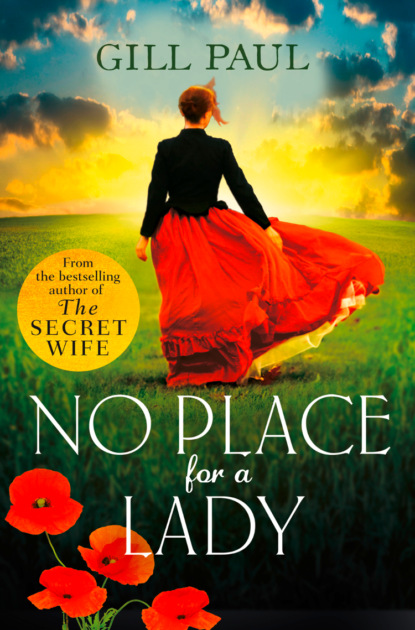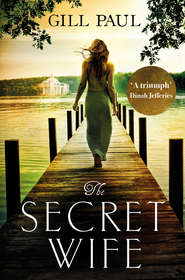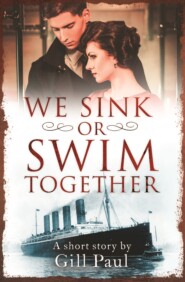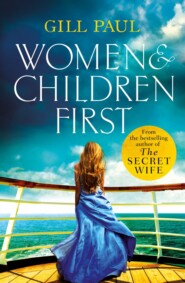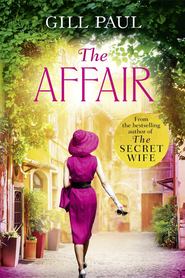По всем вопросам обращайтесь на: info@litportal.ru
(©) 2003-2024.
✖
No Place For A Lady: A sweeping wartime romance full of courage and passion
Автор
Год написания книги
2018
Настройки чтения
Размер шрифта
Высота строк
Поля
‘I rather doubt it; not unless you have medical training.’ Her tone was unfriendly.
‘Will you stay on this ship?’ Lucy asked, thinking perhaps she could leave some of her luggage behind in that case.
‘I believe I am being transferred to the Shooting Star tomorrow as this vessel has to make another journey. Once my horse arrives, I will ride ashore daily to catch up with the troops.’
‘I will see you then perhaps. I am planning to go ashore today.’
Mrs Duberly looked her up and down with disdain. ‘You think you are up to it, do you? You don’t seem the hardy sort to me. Well, good luck to you.’
Further along the corridor, Lucy bumped into Captain Henry Duberly, Fanny’s husband, and offered condolences on the death of their servant. He was more courteous than his wife and when Lucy asked if she might leave behind some belongings to be transferred to the Shooting Star, he promised to arrange it personally.
‘Leave them in your cabin,’ he said, brushing away her thanks. ‘It’s no trouble at all.’
Now all she must do was decide what to take with her. Adelaide suggested she bring her warmest clothing as the night air was becoming chilly although the days were still hot, so she chose a heavier gown of forest-green wool with a floral pattern on the edge of the flounces, her brown boots and a green cashmere cloak, and left behind the eveningwear.
As they prepared to disembark the following morning, the wind picked up, the sea became choppy and heavy clouds scudded in front of the sun. Light drizzle began to fall as Lucy and Adelaide were ferried by rowing boat onto a sandy beach crowded with red-coated soldiers carrying rifles and bayonets, and dozens of fully-laden horses and carts. There was no sign of their husbands and no shelter so after trying fruitlessly to find someone to ask what they must do, Lucy and Adelaide began to march alongside the troops heading for the first night’s encampment. They each clutched their one bag and an army-issue blanket, hooded cloaks wrapped around them against the increasing downpour. They had brought some rations of black bread and salt meat from the ship, so they ate as they walked and drank water from wooden flagons.
The men came to a halt on a barren plain and began to set down their weapons, but there was no sign of any tents and Lucy and Adelaide asked a passing captain where they should rest.
‘You must find shelter where you can, Ma’am. The tents have not yet come ashore.’
‘Do you know where our husbands might be? They’re with the Hussars.’
He shrugged. ‘I’m afraid I don’t have that information. It’s possible they have been sent ahead on reconnaissance.’
Lucy felt a quiver of panic. No one was looking out for them. They had been warned this might be the case but the reality was terrifying. It seemed they were to sleep out of doors in a hostile land, where Russians might arrive to kill them in their bedding rolls if the elements had not first given them a fatal chill.
‘The French camp was erected last night,’ Adelaide protested. ‘They are preparing dinner at this very moment, while we must survive on cold rations in the open air.’
‘I am sorry, Ma’am.’
Adelaide shook her head crossly. ‘We must make the best of it then.’
Some folk were fashioning improvised shelters out of brushwood, but Lucy and Adelaide found a wagon that appeared to have been abandoned, and placed their blankets and bags underneath to lay claim to it. Adelaide tried to start a small fire in a sheltered spot by a bush but it sparked then fizzled out, creating a column of smoke but no heat. When darkness fell they crawled under the wagon and wrapped themselves in their blankets, using their bags as pillows, but the noise of the rain pounding on the wood and the groans of those who had failed to find any shelter combined to make sleep fitful. It was the most uncomfortable experience of her life, but Lucy told herself she could put up with it for one night. She must.
When the bugles sounded at daybreak, they emerged stiff, cold and bedraggled. The rain had eased enough to strike a fire from some kindling Adelaide had thought to place beneath the wagon to dry out. Being able to boil water and brew tea made them feel a little more human. Mid-morning, Charlie came riding up and Lucy screamed with delight. He leapt from his horse and wrapped his arms around her, lifting her face to his.
‘Look at you! A night on the road and you are as beautiful as ever. I’m so proud of you, my adorable wife.’
She felt like bursting into tears, telling him how scared she had been and begging him not to leave her again, but she swallowed the words. She was an army wife now and must not swamp him with her fears. ‘Will you be staying with us tonight?’
‘I think it’s unlikely, my dear. My men are riding ahead to establish where the Russians are holed up and I must be on hand for them to report to. Bill is in the same position. But you two seem fine on your own. As soon as we can, we will return.’
‘Must you leave straight away? Is there no time for some tea?’
He shook his head with a regretful smile, then gave her a lingering kiss on the lips. ‘I can’t wait to lie with you again,’ he whispered. ‘We must be patient. Remember that I adore you.’ With that he leapt onto his horse, saluted them and rode off. Adelaide had been hanging back to give them some privacy but now she called after him, ‘Tell Bill I am well and miss him dearly.’
Some of the tents arrived later that day and a couple of soldiers took pity on Lucy and Adelaide and erected one for them. For the next two days they stayed in camp, with occasional visits from Charlie or Bill to reassure them, until on the morning of the 19th September they were told to pack for the long march south towards Sevastopol, where the Russians were at last to be defeated. A vast column formed, with French troops to their right and Turkish bringing up the rear, and Lucy listened with interest to the babble of languages being spoken as these men from quite different backgrounds joined cause against a common enemy. Amongst the British ranks, everyone’s mood was lifted by the music of the regimental bands playing patriotic classics such as, ‘Cheer, boys, cheer’. It was hard for the women to keep pace with the marchers as their boots slipped on rough scree and their long gowns became entangled in thorny bushes. Lucy and Adelaide found the Turkish troops starting to overtake them. Two dark-complexioned Turks – men of whom Lucy would normally have felt nervous even though they were allies – took pity and carried their bags for a while, until their commanding officer shouted something and they handed them back apologetically.
Lucy’s limbs ached and a blister on her right heel became more and more inflamed as the day wore on, but at least she was not afraid of ambush by Russian troops with so many soldiers around them. There was general grumbling, with many wondering why they had not landed closer to Sevastopol and attacked immediately, but Adelaide assured Lucy that Lord Raglan and the French commanders must have some clever plan in mind.
In the afternoon they reached a stream and stopped to drink. Lucy removed her boot to bathe her poor heel in the cool water. A whisper went round and, looking in the direction others were peering, she saw the hazy shape of a gathering of people on a ridge ahead.
‘Are these … are they Russians?’ she asked a nearby soldier and he confirmed they were.
A thrill of fear ran through Lucy and she clutched Adelaide’s hand.
‘I hope we’ll get a chance to fight them,’ the soldier said. ‘The cowards have been retreating but I hear they are encamped just a mile ahead at the River Alma and we plan to attack them there.’
Now the troops had reached this point, it seemed inhumane, outlandish even, to Lucy that the men around her were going to attempt to kill those who stood on a distant ridge. Could they not sit down and talk through their differences, as women would have done? But she didn’t voice her thoughts, not even to Adelaide. She was an army wife and this was what armies did.
Charlie and Bill returned that evening and Charlie brought out a bottle of porter he had purloined from somewhere. The ladies accepted a glass each, as did Bill, and Charlie entertained them with stories of the rivalries between the Earl of Lucan and the Earl of Cardigan, who were brothers-in-law yet hated each other vehemently.
‘What is the source of their quarrel?’ Adelaide asked.
‘Cardigan thinks Lucan doesn’t treat his sister well enough,’ Charlie replied. ‘Marriages can bring out the worst in families.’ He caught Lucy’s eye and winked. ‘It’s rather alarming that our commanders don’t get along but one can only hope it won’t affect their judgement.’
At that moment a messenger came to summon Charlie; Major Dodds wished to have a word about plans for the morning. Adelaide went into the tent to prepare for bed, leaving Lucy and Bill chatting by the fireside. Emboldened by the porter, she took the opportunity to ask about Charlie’s family.
‘Adelaide tells me you have met the Harvingtons.’
‘Yes, on a few occasions.’
‘What manner of people are his parents? His two brothers?’ She was curious to hear everything, since Charlie would never speak of them.
Bill paused. ‘I didn’t know them well. His father is a stern, rather old-fashioned man.’
‘I hope when we return from war, I might meet them and we will be able to repair the rift that has distanced them.’
Bill poked the embers of the fire warily. ‘Charlie has not told you of the tragic circumstances of the rift?’
‘No, not really! At least, all he told me was that it involved an argument over a debt. What happened? Pray tell.’ She watched him eagerly.
‘It is for him to tell you. I’m sure he will one day, but for now all you must do is give him as much love as you possibly can, because he needs it and he deserves it. Fate has dealt him a cruel blow in the past. But I have observed you, Lucy, and I think you have the right mixture of qualities to be an excellent wife for him. I’m so glad he met you.’
She was rendered momentarily speechless by this puzzling outpouring. ‘Thank you. I hope I will do my best. But …’
There was no time for further questions as Charlie rushed back with news: ‘Four a.m., Bill. You and I are on the right flank.’
A shiver went down Lucy’s spine.
This was it.
The two men spoke head to head for a few minutes, serious, professional. She rose and went into the tent to prepare for bed. When Charlie came, they lay with their arms round each other, faces close, but she knew his thoughts were elsewhere – as were hers. Her heart was pounding with the knowledge that next day he must fight and there was a chance he might not return. How did any wife cope with this? All she could do was breathe slowly and remember that he was Lucky Charlie who did not catch cholera when all around him were falling sick. He may have had a difficult past but now he had her and she would look after him. She breathed in his scent to memorise it and clung to his warm flesh, as if trying to imprint it on her own.
Their husbands rode off at the crack of dawn. Lucy could still feel Charlie’s hurried last kiss on her lips, and wondered if she would ever have a chance to kiss him again. As she and Adelaide made tea they were uncharacteristically silent.
Some women were climbing to a ridge from which they could view the battle so Lucy and Adelaide followed. From the top they were close enough to see the main Russian encampment just across the River Alma, close enough to make out smoke from their fires drifting into the air. It was eerie to think of them sleeping in their tents and heating food, just as in the British camp, perhaps some of them also accompanied by their wives. Yet soon they must be attacked and driven back; soon they must be killed.





